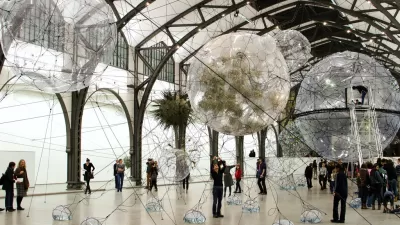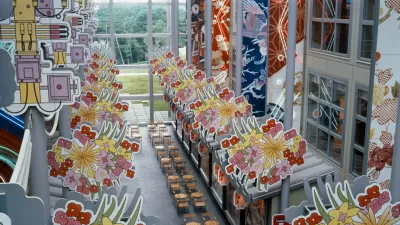World
Global issues, U.N., etc.
Driverless Cars Are Coming, But They'll Bring Congestion and More Fuel Consumption
Although driverless vehicles are being touted for their potential to reduce congestion and fuel consumption, among other benefits, Casey B. Mulligan argues they'll actually induce the reverse.
'Stroller Index': A Thermometer for Measuring the Health of Your Neighborhood
According to Mark Funkhouser, former mayor of Kansas City, there may be no better measure of a city's livability than whether parents want to raise children there. He explains why everyone benefits when sidewalks are filled with baby strollers.
Integrating Conservation into Planning Processes
Conservation areas can provide a variety of benefits to localities, including improving public health, raising property values, and sustaining ecosystems. Proactive conservation strategies are the best way to ensure those benefits accrue.
Children of the Past Envision the City of Tomorrow
How did childhood visions of future cities differ for kids growing up in the 1980s when compared to the 1960s or today? Matt Novak shares a short film from 1983 that captures the prescient urban visions of students.
The Right Mix of Skills is Key to Effective Community Design
According to Arianna McBride, the recipe for good community design must effectively balance community wisdom with expert knowledge. She shares three ways that planners can facilitate the type of participation that leads to great places.
Ways to Fail at Form-Based Codes 02: Make it Mandatory Citywide
Ambition is good, but don't bite off more than you can chew. Hazel Borys applies this valuable lesson to form-based codes.
To Fend Off Emerging Threats, Evironmental Protections Need a Revamp
The environmental awakening of the 1970s led to landmark federal laws that have helped heal our natural systems. The growing “Rights of Nature” movement seeks to create new protections to respond to emerging ecological threats.

10 Rail Stations on the Road to Recovery
As golden age of train travel came to an end, the fate of the world's train stations became unclear. But by utilizing their grand, flexible spaces, creative designers have found a variety of ways to keep the relics relevant.

Still Learning: An Interview with Denise Scott Brown
In excerpts from an interview with Planetizen contributor Sean Varsolona, Denise Scott Brown of Venturi, Scott Brown and Associates offers insights and provocations on sustainability, New Urbanism, and the social awareness of today’s young urbanists.
Friday Funny: Train Junkies Start Young
Our ongoing efforts to identify the world's biggest transit freaks got a boost last week from The Onion, who documented the travails of 3-year-old train junkie Logan Gunter.
IEA: No Progress in Cleaning World's Energy Sources
According to a newly released report by the Paris-based International Energy Association (IEA), "Tracking Clean Energy Progress 2013", notwithstanding some bright spots, there is little progress in reducing the carbon content of energy sources.
Resurrecting Ancient Cities from the Dead
Rather than continually build new towns on the outskirts of today's cities or struggle with creating a sense of place in newly constructed environments, could we resurrect old settlements to connect the old with the new?
Atlanta Artist Paints Suburban Ennui
Today's suburbs have discarded the human-scaled patterns they once promised. This newly resurfaced series of paintings from Atlanta artist Meg Aubrey will leave you longing for the world we neglected to build.
Environment Explains Obesity
Tara Haelle examines the growing consensus among scientists that environmental factors, rather than genes or sloth, are the primary cause of childhood obesity. The onus is on planners and policy makers to create environments that nurture health.
How to Win at the 'Planning Game'
Julia Vitullo-Martin reviews Alexander Garvin's new book, "The Planning Game," which examines four case studies for lessons on how shrewd investments in the public realm can revitalize a city.
Get Your Garden Room Right
Springtime is outdoor living time. Make the most of yours with Susan Henderson's handy guide to garden rooms.
The Invisible Answer to Bike Helmet Hair
Developed by industrial designers Anna Haupt and Terese Alstin, the Hovding is an "invisible bicycle helmet" that may be the key to unlocking anxiety over mandatory helmet laws.
Another Reason to Keep Kids Away from Traffic: Cancer
Add cancer to the growing list of ailments being linked to childhood exposure to vehicle emissions, say researchers from UCLA, USC and UC Irvine.
Paolo Soleri, Visionary Who Merged Architecture with Environmentalism, Dies at 93
Soleri, the founder of the experiential community of Arcosanti, who in many ways presaged the modern sustainability movement, passed away on Tuesday at Cosanti, his home in Paradise Valley, Arizona.

The World's Most Amazing Train Trips
With the pleasures of train travel again attracting customers around the world, the staff at Executive Travel magazine have put together a list of the most scenic journeys traversed by rail.
Pagination
Urban Design for Planners 1: Software Tools
This six-course series explores essential urban design concepts using open source software and equips planners with the tools they need to participate fully in the urban design process.
Planning for Universal Design
Learn the tools for implementing Universal Design in planning regulations.
Heyer Gruel & Associates PA
JM Goldson LLC
Custer County Colorado
City of Camden Redevelopment Agency
City of Astoria
Transportation Research & Education Center (TREC) at Portland State University
Jefferson Parish Government
Camden Redevelopment Agency
City of Claremont


































